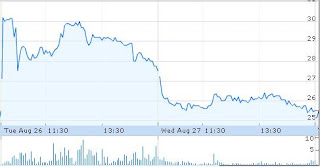
The three current oil markets are all US dollar denominated: North America's West Texas Intermediate crude (WTI), North Sea Brent Crude, and the UAE Dubai Crude. The two major oil bourses are the New York Mercantile Exchange (NYMEX) in New York City and the International Petroleum Exchange (IPE) in London. This means that if you want to buy crude oil you will have to pay in U.S $ and even sell it in exchange of the same. Since, crude-oil cannot be bought or sold in any other currency every nation has to buy U.S $ and gear up their dollar holdings first. The demand for crude oil transforms into demand for U.S $ reserves across the world. From that point, every nation that needed to buy oil had to firstly hold US dollars, which meant that they exchanged their goods and services for dollars, which the Americans just printed.
There is no serious indication that the countries of the world, including the oil exporting countries are ready to accept a Euro based oil market. Since 1986 the oil prices are determined according to complex tables and spot changes in the New York and London exchange markets. OPEC countries are not ready to change the basis for oil transactions so easily. OPEC has tried several times to change the basis for the oil prices to Euro, or Special Drawing Rights (SDRs of the IMF) or a basket of currencies and each time it has been abandoned.
Now, imagine a situation when more and more OPEC nations agree on selling crude oil in exchange of other major currencies like Euro, Yen or Pound. What if even the Americans also have to buy their oil with Euro or Ruble instead of U.S $ (which they just printed)? All nations then would not have the acute necessity to exchange their goods/services for U.S $ and thus the demand for U.S $ would go down. Also, the Americans may face the end of their ‘free lunch’ – the crude oil they bought by printing U.S $.
Professor Krassimir Petrov, from the American University in Bulgaria (his article on this subject has been used by countless sources and websites as an academic argument for the validity of petrodollar wars theory) writes: "... Bush's war in Iraq was not about existing weapons of mass destruction, about defending human rights, about spreading democracy, or even about seizing oil fields. It was about defending the dollar, ergo the American Empire; it was about setting an example that anyone who demanded payment in currencies other than U.S. Dollars would be likewise punished....”



